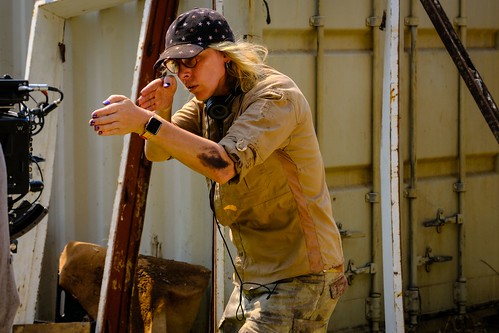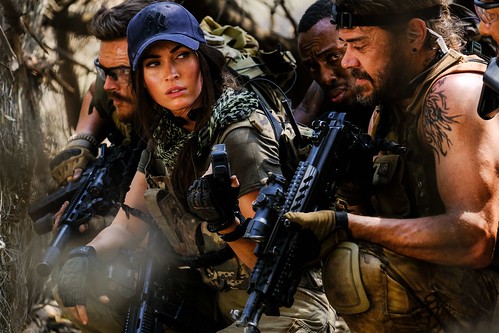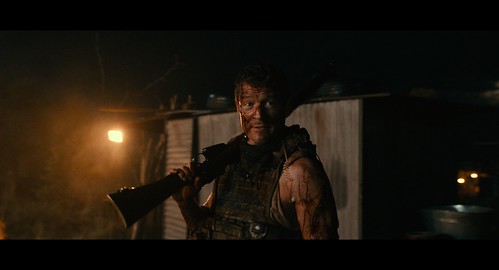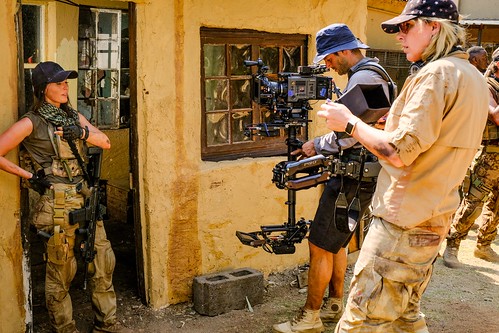Movies & TV / Columns
M.J. Bassett On Her New Film Rogue, Working With Megan Fox, More
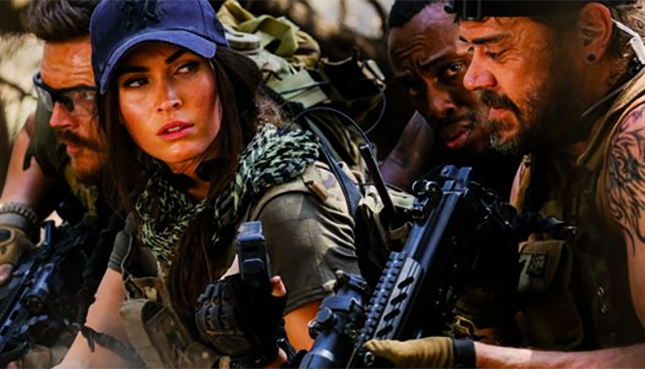
The 411 Interview: M.J. Bassett
M.J. Bassett is a writer, director, and producer who has been working in show business, according to imdb, since at least 1997. Bassett has directed such movies as Solomon Kane, Silent Hill: Revelation, and Inside Man: Most Wanted, and such TV shows as Strike Back, Ash vs. Evil Dead, Power, and Altered Carbon. Bassett’s latest movie is the action flick Rogue, starring Megan Fox and Philip Winchester, which is available on Digital and On Demand starting August 28th, 2020, and is set to hit DVD on September 1st, 2020. In this interview, Bassett talks with this writer about making Rogue, working with Megan Fox, and more.
**
Bryan Kristopowitz: Why did you want Rogue to be your next feature film as a director?
M.J. Bassett: Well, it really wasn’t about it being my next feature film as a plan. It was the right moment that came along to be able to tell the story that I wanted to tell. My producer, Molly Hassell, called me and said she had an opportunity to make some movies which had an environmental theme. I’ve been involved in the environmental movement my whole life. I started in the UK as a “wildlife expert” hosting TV programs and documentaries when I was much, much younger and I ended up making movies and TV shows which were all noisy action genre things (fantasies, car chases, gun fights) and suddenly I realized I could actually take an opportunity to make an environmental movie and actually make it a genre picture as well. So, to do all of the things that I loved in filmmaking and to make them about something. So once I realized that this was possible and that Lionsgate were going to support this I came up with Rogue. The idea, of course, was to make a genre action-adventure with lots of fun, entertaining elements in it.
BK: What was your inspiration for the story in Rogue?
MJB: The inspiration really came about from the fact that I’ve been doing a lot of work in South Africa on a show called Strike Back, which is a big military adventure show, and then I made some movies down there as well. And I love South Africa. I mean, I love all wildlife places and the knowledge came to me that they started lion farming. There are, like, 12,000 lions in farms in South Africa, and they’re being used for canned hunting and they’re being killed for their body parts to be used in the traditional medicine market in the east. And I’d seen some of the conditions these lions are kept in and I just thought it was horrendous. And I thought that might be a sort of backbone of a story to tell without it being a kind of “eat your greens” eco movie. So the idea was, really, to just try and make something that was a fun movie at the top of it but there were other layers there to be explored if you wanted them.
BK: Describe your collaboration on the script for Rogue with Isabel Bassett?
MJB: One of the great joys of making this film was I did get to work with my youngest daughter Isabel. She is a very talented young writer but doesn’t really work in the genre world like I do, but when I told her the story for Rogue she got really engaged in it. And I needed somebody to work with because I was busy making some other stuff at the time. I pitched her the story and wrote out an outline, she came back with a script that I really liked and then I did some work on it myself and then between the two of us we sort of moved the script forward to a place where it could be shot. She has a young person’s voice, she’s very feminist and empowered as a young woman. And it was an incredible pleasure working with her. And then, of course, she ends up appearing in the movie as well because the film was supposed to be so low budget that I couldn’t really afford to get a cast beyond my friends/actors I’ve worked with and people who wanted to come and have an adventure. So Izzy was cast as one of the kidnapped girls in order to save some money. But she’s a good actress. She appeared in a film of mine called Solomon Kane about ten years ago when she was very young. She played a little witch. And she’s always been comfortable on a film set and she actually does incredibly well as an actress as well as a writer so she’s a multi-threat. But it was really fun working with her and she knows me, she’s been through all of my troubles and my transition. She’s an incredible support to have around.
BK: Where was Rogue filmed?
MJB: Rogue was filmed in South Africa at a game farm about forty minutes outside Johannesburg. We shot it pretty much all in that one area with a couple of journeys to some of the more exotic locations but, yes, it was all Johannesburg.
BK: How did you cast Rogue?
MJB: Well, initially, when making the movie it was supposed to be a very low budget project so I didn’t have any anticipation to cast big names. I called Philip Winchester, who is a very good friend of mine I worked with on Strike Back and Solomon Kane. Philip wasn’t doing anything so I asked him if he wanted to come to South Africa for an adventure, to run around and get grubby like we always used to do on Strike Back. And he was completely up for it. And the rest of the cast I had worked with on various other projects as well. But then we were looking for the female lead. And the script was very strong and everybody in LA was saying you should go out to some big name actresses and see if you can get somebody. And Megan Fox’s name was mentioned. But I really didn’t think it would be right for her. I didn’t think she would be interested in this very kind of physical, kind of alpha woman role, but it turns out this was exactly what she was looking for and she really responded to the script and to the content of it, not just from a kind of environmental theme point of view but also from the fact that the female lead is not a sexual character she’s just a tough woman doing a tough job and Megan really responded to that in a way that allows her to move the perception of her. Of course, the public sees Megan Fox in a very particular way and the reality is she’s a different person, she has a different range. I was really happy to have her on board. It was a big surprise to me to get such a big name but it was a pleasure and she was terrific and she got stuck in just like everybody else. No special treatment. She was great.
BK: What was the hardest part of making Rogue for you as a director?
MJB: It was a very tough film to make because it was low budget and a short schedule so we had to do an awful lot in not much time. And I was a producer on the film as well as the writer/director and I had to have an eye on all aspects of the film so the challenge was actually a kind of production challenge. Actually making the movie was not super hard for me. I love doing action, I love shooting in difficult locations, and so as long as you surround yourself with people that can do what you can do and move at a swift pace and understand what you’re trying to do the actual filmmaking is an incredible pleasure. I mean, there were tough days because it was hot and the environment was challenging. South Africa is an unforgiving country. There were days where it was roasting hot, there was dust everywhere and in the evenings there were lightning storms and torrential rain. But you know this is going to happen so you have to anticipate it and work with it so the hardest part was doing it on time and on budget. But the making of the movie was an absolute pleasure.
BK: How long did it take to make Rogue, from finishing the script to completing post-production?
MJB: It was a really fast process from actually just talking about making the movie, to writing the script, to shooting the movie and then delivering the movie to Lionsgate. We come out in the U.S. on the 28th of August and it’s pretty much a year from when we first started talking about it to when it came out which is the fastest I’ve ever done a movie. And actually what took longest was doing the VFX at the end and even those had to be done very quickly. Normally a 3D creature, because the lion is almost all 3D with some puppet work and a very little bit of a real lion as well, that’s what we waited for. We could have delivered the film much earlier, so it took about a month and a half to write the script, 22 days to shoot it, and then some months of editing and post-production. Very, very quick.
BK: How did you create the lions seen in the movie?
MJB: The lions in the movie are mostly digitally created. There are a few sequences at the very beginning where real lions were involved and then some close-ups involved a puppet head as well. And I didn’t use real lions for a couple of reasons. One is I don’t like having real animals on a set if I can avoid it, particularly predators because they get stressed out very easily. And, of course, they’re dangerous. A lion is a super dangerous animal to have near actors and the few times we did use lions we had to be the ones in the cages. And I don’t think it’s fair, particularly in a world where a digital creation can be done. So I made the choice to use digital lions. Whether they turn out well or not is up for the audience to decide. I’m happy to do it that way because I get the performance that I want as well. The lioness in the movie is a character and she has a story and it was important to portray that. And I didn’t think we had the time to work with real lions to try and get those kinds of performances anyway. So, it was a compromise to do it digitally but it was best for the animals as well, particularly for a movie that’s very conscientious about how we treat wildlife.
BK: Is it right to call Rogue a kind of horror movie, or is it more apt to call it a full on action movie?
MJB: Well, the great thing about Rogue for me is it covers a number of genres. There are elements that are pure action. The first 25 minutes of Rogue is just a relentless, breathless action sequence where, I think, the audience is as exhausted as the characters. That is exactly what I intended. But then it transitions into the kind of horror movie space for a while. It’s like a creature feature, there’s a danger out in the darkness, and we’re killing off our characters one by one, and then it synthesizes back into an action piece. And in the middle of that there’s character stories going on as well. So what I love is that, hopefully, what the audience will love is that there is a number of genres going on. And in the middle of it it’s very funny. There are lots of really good lines of dialogue and the characters are great. Philip Winchester is incredibly funny. And the audience will, hopefully, that was the plan, to have a really, really good time.
BK: You’ve made a number of feature films in your career, like Solomon Kane and Silent Hill: Revelation, and you’ve worked on such TV shows as Ash vs. Evil Dead and Strike Back. Do you have a preference directing movies or television?
MJB: The reality is I prefer movies as a writer/director because, obviously, I get more creative control and I get to tell stories which I want to tell, particularly with Solomon Kane and my first one, Deathwatch, as well. And now, with Rogue, they are movies that I had a strong authorial control over. Silent Hill was a game adaptation, shot in 3D, so that was a very different kind of experience. I love doing TV. I had the best experience on Strike Back because I kind of ran that show for three seasons as executive producer and director and, occasionally, writer as well. So, as a director, as any kind of creative person you want to have as much control as possible so I like the ones where I have that. I adore doing television. I adore doing Altered Carbon and Power and Ash vs. Evil Dead. It was incredible fun and a real privilege to do them all, and if you find a team that you like to work with and a great show runner and a great production, they are amazing experiences. And, generally speaking, I tend to be doing a lot more movies now. Again, they’re low budget because I don’t particularly want to work in the big studio space. I like to be left alone, I like to do what I’m going to do. But I never say never to anything. A good project is a good project. The joy of this business is you get to work with great people.
BK: What’s your favorite genre to work in?
MJB: I really think I’m an action director at heart because I love the physical aspect of doing these things. I love the kinetic energy, I love to plot out the action, I like to drive around in cars and shoot guns and jump off things and set fire to things and do explosions. These are just things that I love to do and be involved in. Horror is always fun but I feel I’m probably a better action director than a horror director. Thrillers, fantasy stuff, sci-fi, I live in this genre space, so fantasy is a great, great love of mine. Very hard to make, very expensive, and it’s hard to get those films financed. But with something like Rogue, honestly, it’s my perfect movie. It does all of the things I wanted to do. So, that’s the genre I want to work in.
BK: Any moviemaking heroes?
MJB: Oh, so many. I mean, Alien was the movie that I was obsessed with when I was a teenager, and so Ridley Scott is my idol. I’ve never met Ridley and I kind of don’t want to because I idolize him and his vision so much. David Fincher is amazing. Oliver Stone was an incredible influence. I like Wes Anderson and the Cohen brothers because they make films I can’t make. I don’t have the vision for those kinds of movies. Filmmakers that sort of do the kind of stuff that I do, it’s harder to idolize those kinds because I see the pieces and I know it. But there are filmmakers who you just watch and can’t believe the vision and the voice that they have. There are so many. I love movies. I love filmmakers.
BK: Any upcoming projects you reveal?
MJB: I’m actually packing my bags right now to go to Kenya to start another movie which is a survival drama. Again, it will fit into a number of different genres. At its heart that film is more of a dramatic family story set against the backdrop of Africa (as you can tell I love shooting in Africa). There’s a story, a transgender story, that I want to tell because I’m a transgender woman. So that’s something I would like to do but, again, do it in a genre way. There’s loads of things that I’ve got planned. I’m just happy to be working.
BK: This may seem like a weird question, but how the heck did anyone cool down while making Rogue? It looks like it was a million degrees most of the time.
MJB: Yeah, it was a very challenging shoot. It was super hot, it was super dusty. It was a very extreme way of filmmaking. And Africa is tough. But what the important thing was to have a crew and a team that knew how to deal with that. So, we cooled down by, actually, just enjoying people’s company. I make movies where it’s a family experience for everyone, we got on really well. It’s a fun set, and often we cool down because the thunderstorms come in and it would start raining. So the conditions were very extreme. Also, a lot of the team were very fit people. They’re all ex-military or fitness fanatics or people who can deal with the extreme, they can deal with the bumps and bruises and the conditions. So, yeah, it’s a tough world. But I also tell everybody who comes on to one of my movies it’s probably going to be one of the hardest things you ever do. And pretty much every actor said “Yep, that’s true, it’s the hardest thing I’ve done.”
BK: Who came up with the Yankees hat worn by Megan Fox’s O’Hara? Were any other baseball teams considered?
MJB: The hat was chosen by me and my costume designer. I just really liked it and Megan thought it was good for her character. I actually don’t know enough about baseball to have had any opinion on the team, but my American friends said that’s a good hat and I thought she looked great in it. It was really all about the aesthetic. Megan is a great looking lady and she looks good in anything so I thought the Yankees hat looked terrific. If it had been me it probably would have been a UFC hat because I’m a big UFC fan. I’ve worked with Michael Bisping on Strike Back and he’s a good friend of mine. I’m always looking to try and cast some of those guys in any of the movies that I do because I love them all so much. So, maybe next time around you’ll see a UFC fighter in the movie.
**
A very special thanks to M.J. Bassett for agreeing to participate in this interview and to Priscilla Rios for setting it up.
Rogue is available on Digital and On Demand starting August 28th, 2020. It hits DVD on September 1st, 2020.
All images courtesy of Lionsgate.


